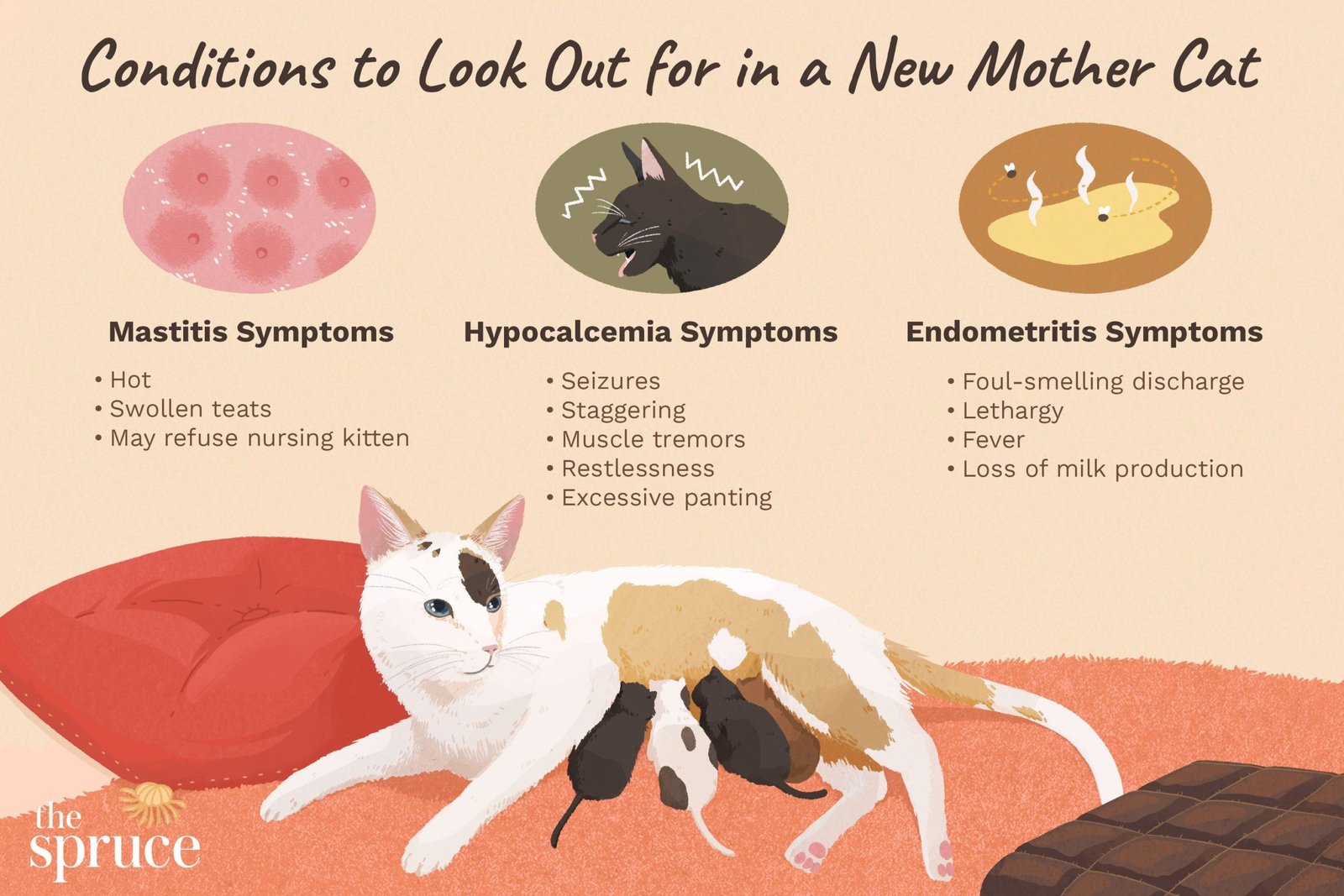Proper postnatal care is important for a mother cat and her newborn kittens. While the mother cat will handle most of the care, it is crucial to regularly check on the kittens to ensure their health and well-being.
Providing a clean, warm, and dry place, such as a nesting box, is essential for their overall health and survival. Additionally, it is important to wait a few weeks before touching the kittens to avoid any potential harm or infection.
Once they reach around two weeks of age, it is safe to introduce them to human touch and socialization. By following these guidelines, you can ensure the best care for the mother cat and her newborn kittens.
Importance Of Postnatal Care
Postnatal care is crucial for a mother cat and her newborn kittens. Providing a clean and warm place, frequent checks on the kittens’ health, and allowing the mother to care for them are essential for their well-being and survival. A nesting box can help create a safe environment for their development.
Ensuring The Well-being Of The Mother Cat
Once the mother cat has given birth, it is crucial to prioritize her well-being. Creating a clean, warm, and dry environment is essential for her and her newborn kittens. Providing a nesting box will not only offer comfort but also promote better health and survival for the mother and her kittens.
It is important to keep the room quiet and minimize disturbances to allow the mother cat to care for her kittens undisturbed. However, it is equally important to keep a close eye on the kittens to ensure they are feeding properly. Finding a balance between monitoring them and giving the mother cat space is key.
Promoting The Health Of The Newborn Kittens
Newborn kittens require frequent feeding, usually every two to three hours. It is essential to ensure they are suckling well from their mother, as they do not need additional nutrition until they are three to four weeks old.
If the mother cat is not providing adequate nutrition, the kittens may cry and constantly seek the teats. In such cases, it may be necessary to provide supplemental feeding under the guidance of a veterinarian.
After two weeks, it is safe to introduce the kittens to humans and handle them. This period, from weeks two to seven, is crucial for socialization. However, it is important to be sensitive to the mother cat’s comfort and monitor her reactions.

Proper Nutrition And Feeding
Providing proper nutrition and feeding is crucial for the health and well-being of a mother cat and her newborn kittens. Meeting the nutritional needs of the mother cat and ensuring a smooth transition to solid food for the kittens are essential elements of postnatal care. In this section, we will discuss how to meet the nutritional needs of the mother cat and establish a feeding schedule for the growing kittens.
Meeting The Nutritional Needs Of The Mother Cat
During the postnatal period, the mother cat’s nutritional needs increase to support the production of milk and overall recovery. Providing a high-quality, nutritionally balanced diet is essential. The diet should be rich in protein, as it aids in milk production and helps the mother cat regain her strength. Offering a combination of wet and dry food can ensure she receives all the necessary nutrients. Ensure that the food is specifically formulated for nursing cats, as it contains the right amount of protein, vitamins, and minerals to support her and her kittens’ health.
Feeding Schedule And Transition To Solid Food For Kittens
Newborn kittens rely entirely on their mother’s milk for the first few weeks of their lives. It is crucial not to interfere with their feeding schedule during this time, as their mother provides essential nutrients and antibodies. Gradually, between three to four weeks of age, you can introduce solid food to the kittens’ diet.
To ensure a smooth transition, start by offering small amounts of kitten-specific wet food, mixed with a kitten milk replacer. Provide this mixture in a shallow dish for the kittens to explore. Slowly increase the amount of solid food and decrease the milk replacer over time. By around six to eight weeks old, the kittens should be fully weaned and solely eating solid food.
It’s important to note that each kitten may progress at a different pace when transitioning to solid food. Monitor their weight gain and consult a veterinarian if you notice any concerns.
Feeding schedule:
| Age | Frequency |
|---|---|
| 0-4 weeks | Every 2-3 hours |
| 4-8 weeks | 4-6 small meals per day |
| 8-12 weeks | 3-4 meals per day |
As the kittens grow, monitor their behavior and adjust the feeding schedule accordingly. Offer fresh water at all times and provide kitten-specific dry food for them to nibble on as they become more independent.
By following these guidelines, you can ensure that both the mother cat and her newborn kittens receive the proper nutrition they need for healthy growth and development.
Creating A Safe And Comfortable Environment
Creating a safe and comfortable environment is crucial for the postnatal care of a mother cat and her newborn kittens. Providing a clean, warm, and dry nesting box will promote their health and survival. Regularly checking on the kittens and ensuring the mother is caring for them is essential.
Providing A Clean And Warm Nesting Area
One of the first steps in creating a safe and comfortable environment for a mother cat and her newborn kittens is to provide them with a clean and warm nesting area. This nesting area should be free from any dirt or debris that could pose a health risk to the kittens. It is important to regularly clean the bedding and ensure it stays dry to prevent any bacterial or fungal infections.
Minimizing Stress Factors For The Mother Cat And Kittens
In order to ensure the well-being of the mother cat and her newborn kittens, it is crucial to minimize stress factors in their environment. This means keeping the room they are in quiet and undisturbed, as loud noises and excessive activity can cause stress and anxiety for both the mother and her kittens. It is also essential to limit the number of people handling or interacting with the cats, as too much human contact can be overwhelming for them.
- Provide a clean and warm nesting area
- Regularly clean the bedding and keep it dry
- Minimize loud noises and excessive activity in the room
- Limited human contact and handling of the cats
:strip_icc()/time-to-eat-small-kittens-642602780-5b2ea7691d640400378a7574.jpg)

Frequently Asked Questions Of Postnatal Care Of A Mother Cat And Her Newborn Kittens
How Do You Take Care Of A Mother Cat And Newborn Kitten?
To take care of a mother cat and her newborn kitten, allow the mother to do most of the initial care. Ensure the kittens appear healthy by frequently checking on them. Provide a clean, warm, and dry place, such as a nesting box, for the mother and kittens.
Wait until the kittens are at least two weeks old before touching them to avoid harm. Newborn kittens should feed every two to three hours. Keep the room they are in warm, clean, and quiet to create a comfortable environment.
When Can I Touch The Kittens After My Cat Gives Birth?
Wait until the kittens are at least two weeks old before touching them to prevent harm or infection. Week two to seven is a good time for socialization with humans. Be sensitive to the mother cat’s comfort when interacting with the kittens.
What Do Kittens Need Right After Birth?
Newborn kittens need to feed every 2-3 hours. They should be kept in a clean, warm, and dry place. Kittens that are nursing well from their mother do not need additional nutrition until 3-4 weeks of age. It is important to wait and watch for the mother cat to return before removing the kittens.
Can You Leave Newborn Kittens Alone With Their Mom?
Newborn kittens should be left alone with their mom as she provides the best care for them. If the area is safe and mom returns, it’s best to let them stay together until they are weaned.
Conclusion
Taking care of a mother cat and her newborn kittens is of utmost importance after the birth. Your careful observation and nurturing are crucial for their well-being. Make sure to provide a clean, warm, and dry space for them, preferably with a nesting box.
Avoid handling the kittens too early, as they are vulnerable to infections. Once they reach two weeks of age, you can start introducing them to human touch. Remember to be sensitive to the mother’s needs and give them the best chance for survival.


